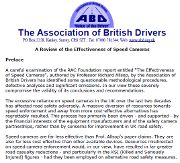1/17/2011
UK: Motoring Group Challenges Speed Camera Safety ReportAssociation of British Drivers disputes report claiming 800 lives lost from cutting back on speed cameras.

A British motoring group last week challenged the accuracy of a widely cited report on the effectiveness of speed cameras. The Association of British Drivers (ABD) released its own analysis disputing the November RAC Foundation study authored by Professor Richard Allsop. Many news reports cited the RAC work to claim that budget cuts forcing the decommissioning of speed cameras would cost 800 lives in the UK. ABD argued that this figure was based on misleading evidence.
Allsop's report relied primarily on a pair of previously conducted studies. The first was the 2005 Four Year Evaluation Report by PA Consulting and University College London, where Allsop teaches. This work relied on self-reported data from 38 speed camera partnerships. Allsop noted that this report did not properly account for the statistical phenomenon known as regression to the mean, so he adjusted the numbers using his own methodology.
"The evidence is by its nature imprecise and incomplete, and its interpretation requires subjective judgment as well as objective calculation," Allsop cautioned. "It should be noted that these estimates take no account of the possibility of the reduction in PIC (Personal Injury Collisions) and KSI (Killed or Seriously Injured) at camera sites may have resulted from diversion of traffic to alternative routes."
ABD pounced on this admission.
"In other words, one of the basic controls that might have been introduced into the study to improve its rigor has not been used -- namely the recording of some traffic counts," ABD researcher Roger Lawson wrote in the group's analysis.
The second study Allsop considered was a 1997 review of speed cameras in West London. Allsop claimed a 6.4 percent reduction in serious accidents after expanding the effects beyond the immediate geographic area where the cameras were installed.
"Professor Allsop suggests that because the impact of particular camera sites (only 21 were installed) is higher than one might expect from other data, his view is that cameras have a more widespread effect than simply at the camera sites," Lawson wrote. "Why would that be so? My suggestion is that this is simply another anomaly which cannot be accounted for and which suggests the basic data is misleading."
The ABD noted that Allsop's figures fail to control for changes in traffic volume and road layout that can affect the outcome. Allsop concluded that photo enforcement is popular in Britain based on a series of polling questions that asked whether respondents believed that the primary aim of cameras is to save lives. The ABD countered that this is not the same as directly asking about support for continued use of cameras.
"The vast majority of the population generally believe that most people have good intentions and are not deliberately attempting to deceive," Lawson wrote. "But that does not mean that those people who reply Yes actually believe that cameras have any efficacy in reducing accidents."
A copy of the ABD analysis is available in a 250k PDF file at the source link below.


